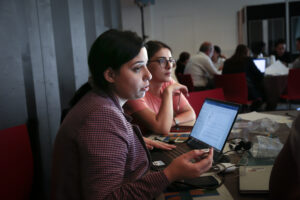Why Civic Space is A Priority for OGP
In recent years, we have seen far too often that there are constant attempts to restrict civic space, instead of promoting and expanding it. Based on monitoring carried out by the International Center for Not-for-Profit Law (ICNL) and European Center for Not-for-Profit Law (ECNL), we have seen that since 2018, 82 countries have proposed 237 initiatives related to civil society. 84 percent of these initiatives have been classified as restrictive. And according to the 2022 CIVICUS monitoring, more than 70 percent of people live in countries where civic space is repressed or closed. This is a global trend and is also visible in OGP member countries.At ECNL, we have been monitoring these developments and have identified a number of trends. In addition to simply restricting the operational space or the possibility to register civil society organizations (CSOs), in a number of countries civic space has been restricted using new types of arguments/mechanisms including:
- Increased use of anti-money laundering and counter-terrorism financing arguments to restrict civil society;
- Increased digital threats such as the use of surveillance measures on civic activists; use of facial recognition; the introduction of various AI tools without human rights impact assessment; restrictions on Internet, including around protests, etc.
- Use of transparency arguments to stigmatize civil society or restrict foreign funding or limit advocacy by treating CSOs as lobbyists, etc.
Ever since OGP was established, civil society has been viewed as an equal partner to governments. This is reflected in the composition of the OGP Steering CommitteeThe Steering Committee is OGP’s executive decision-making body. Its role is to develop, promote and safeguard OGP’s values, principles and interests; establish OGP’s core ideas, policies, and ru... where civil society representatives hold an equal number of seats to participating governmentsOGP participating countries and locals – often referred to as OGP members – are committed to working with civil society to strengthen their adherence to open government values. To join OGP as a pa.... The OGP Participation and Co-Creation StandardsCollaboration between government, civil society and other stakeholders is at the heart of the OGP process. The Participation and Co-Creation Standards are intended to support this collaboration throug... highlight the importance of the engagement of civil society at all stages of the OGP process andconfirm that “a strong and inclusive co-creation processCollaboration between government, civil society and other stakeholders (e.g., citizens, academics, private sector) is at the heart of the OGP process. Participating governments must ensure that a dive... leads to well-designed and more ambitious commitments” and ”stronger results are achieved when collaboration continues through the implementation of reforms”.
Still, the deterioration of civic space and the need to address this challenge have been noted during the consultations on OGP’s new five year strategy for 2023-2028. The number of civic space commitments that governments undertake is still too low to really respond to the needs. That is why naturally, civic space became one of the five goals of the new OGP Strategy.
How we will address the problem in the new strategy
The new OGP Strategy 2023-2028 has highlighted that there can be no open government without free civil society and that OGP is an “equal partnership between government and civil society”. To strengthen this even further, civil society now is clearly included in both the mission and vision of the Partnership, as renewed in the strategy. We will achieve this by:
- Encouraging civic space action and cultivate champions; and
- Enforcing and periodically reviewing OGP policies on civic space.
With this partnership-wide strategy emphasizing the need to protect and expand civic space, we hope more members will take decisive action to do so. It will also include engaging political leaders to proactively speak about the need to protect and expand space for civil society and democratic dialogue, including at high-level events and in bilateral relations.
Other important measures that OGP will take include:
- Using windows of opportunity to get buy-in for the adoption and implementation of civic space reforms.
- Linking the debate on justiceTo address barriers that prevent citizens from having their justice needs met, OGP participating governments are working to expand transparency, accountability, and inclusion into all systems of justi..., anti-corruption, and climate action with civic space issues and challenges
- Embedding civic space as a key priority across activities to build open government leadership and train public servants.
- Supporting champions of civic space in OGP with guidance, learning opportunities, and resources.
In addition, OGP will actively enforce its existing policies related to civic space and participation to ensure both current and new members comply with its standards (Values CheckIn order to join OGP, countries must exhibit a demonstrated commitment to open government values by meeting a set of minimum performance criteria across key dimensions of open government. Beginning in...; Rapid Response, etc.). The OGP Support UnitThe OGP Support Unit is a small, permanent group of staff that work closely with the Steering Committee and the Independent Reporting Mechanism to advance the goals of the Open Government Partnership.... will more proactively highlight instances of progress or regression on civic space among its members.
This is a positive development and I look forward to seeing the results it will bring in the coming years.
Civic space enables people to participate meaningfully in every aspect of their democracies, from social and political issues to even the economy and culture. And to keep our societies and institutions more open, inclusive, and accountable, we need to ensure that civil society organizations, journalists, activists, and everyday citizens are provided a safe space to do just that.
Comments (2)
Dr Kaarel Haav Reply
I hope that the OGP Strategy 2023-2028 will pay more attention to concepts of participative democracy and partnership in school education. These concepts should be central in civics and social studies.
Leave a Reply
Related Content

OGP Strategy
Explore OGP’s 2023-2028 Strategy, how it was developed and how the open government community can help implement it.

OGP’s 2023-2028 Strategy
OGP’s 2023-2028 strategy is now available. With over 1,000 contributions, the open government community helped to identify emerging strategic directions.



John Clark Reply
A valuable analysis, and I hope OGP strengthens its focus on civic space issues to recognize the issues flagged here. As someone who is very involved in citizens’ actions against corruption I particularly welcome the point about “Linking the debate on justice, anti-corruption, and climate action with civic space issues “.
I’d like to add that I am ashamed, as a British citizen, that mine is the ONLY country in the G7 or Western Europe to be shown “orange” in the excellent CIVICUS report linked to this comment. I fear this is the new “orange revolution”